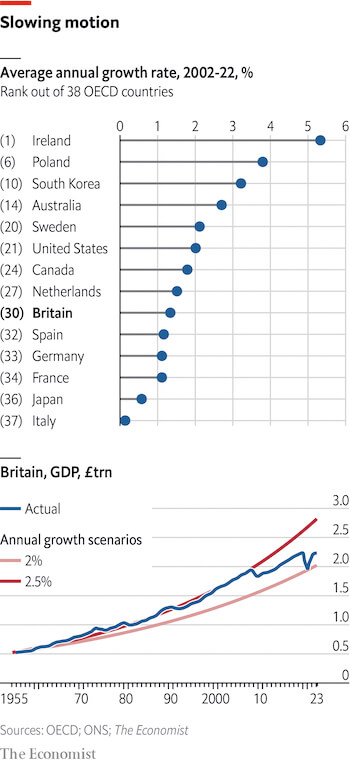
Yesterday I wrote: “The first step in the UK solving their economic problems is to admit it has one“, focussed on the poor economic productivity performance of the UK, although my focus was not on the economics as much as on the human behaviour issue that we have the reticence we often have in taking the first step in solving any problem, which is to admit you have one.
Having written that post, though, I then received (as a subscriber to The Economist, something I recommend to you) the weekly “Blighty” email newsletter, which began with the graphic above. One snippet of the article was this:
Had its economy continued to grow at the trend growth rate of 2.5% a year that it was enjoying prior to the global financial crisis in 2008, the UK economy would today be 25% larger than it is in reality (see bottom chart).
That’s a £0.5 trillion annual shortfall in GDP. A rising tide has the possibility to float all boats (for a political party that believes in that), but an economy that is £0.5 trillion short on GDP has much more limited options, irrespective of your politics on allocating resources.
The writer also did note: “Politicians of all stripes are aware that economic growth is a problem that needs fixing”. Unfortunately, though, I see no politicians really willing to talk about it, perhaps as this is not something that can be turned around in a 5-year electoral cycle and getting a politician to think of the next generation rather than the next election is, well, challenging.
Closing on a positive note, around five years ago I was in New York and was inspired by a young politician, Mike Blake, to write the post “Are you resumé building or legacy building?“. At that event, I was inspired when listening to and then, later that evening, talking with Mike Blake. He isn’t currently directly involved in politics, but I am sure he is still and always will be focussed upon building a legacy rather than his resumé.
